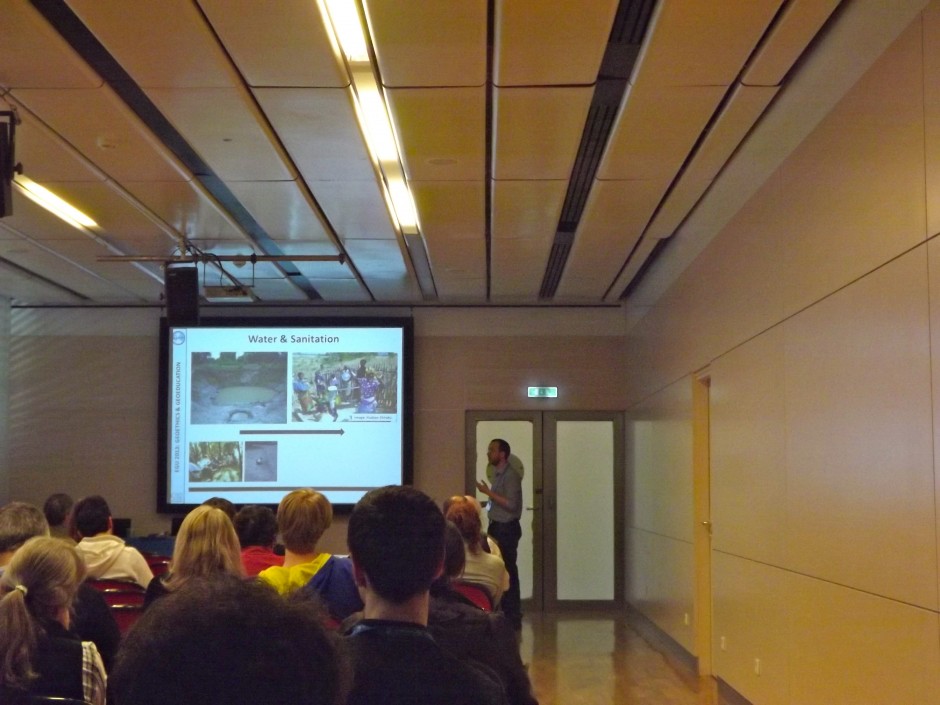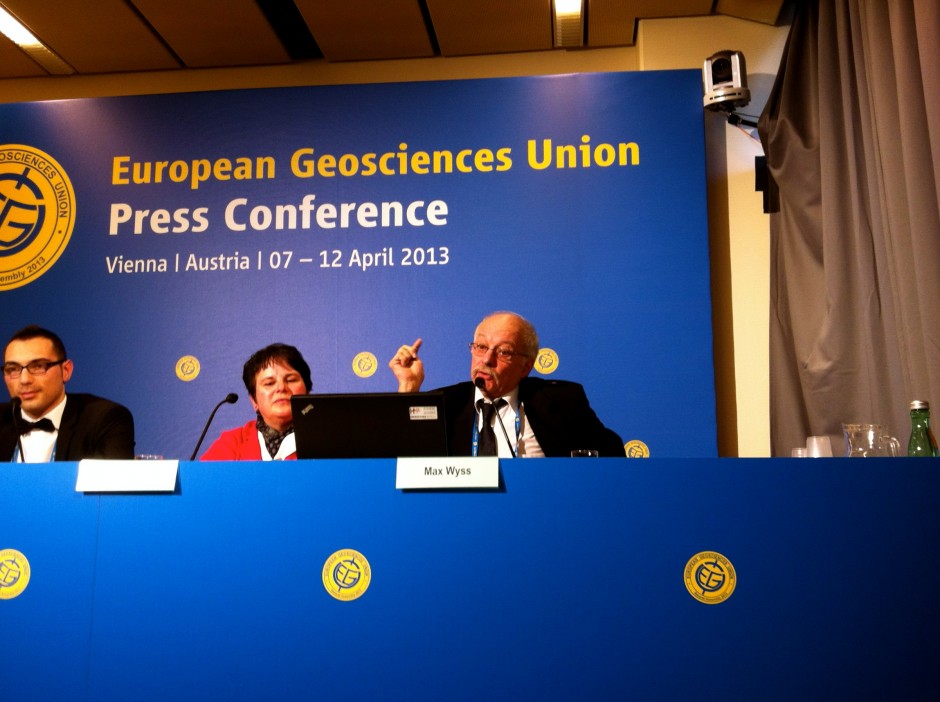Our fourth day at EGU 2013, and not running low on energy (although pretty high on caffeine!). With the panel discussion on the use of blogs and social media in scientific research, our interview with the BBC science correspondent about science communication, and our #gfgdcomp question competition: communication is most definitely the theme of the day.
Joel Gill, GfGD Director, gave a talk today about the value of student placements in a popular session on Geoethics. His talk received a positive reception, and we hope it will encourage people to think about hosting student placements if they are able to. If you missed it, you can read about what Joel had to say on the blog tomorrow.
c
We also interviewed Jonathan Amos, the BBC’s science correspondent. Look out for this on the blog in the near future.
c
Here are a few highlights from the sessions and press conferences we joined in with today:
Alternative Earthquake Prediction Methods
To effectively predict earthquakes we need to find a robust and accurate signal that forewarns of a tremor hours or even days in advance. In 2011 a report from the international commission on earthquake forecasting for civil protection concluded that no such method exists.
Enthusiastic workers in the past proposed prediction methods that were victims of sensationalist reporting, and were later discredited. People began to lose faith in this research field. The field decamped into people who believed the research, despite its uncertainties, and would passionately defend it, and those that dismissed it outright. As a result there has been little funding or progress in the last few decades. But the science of earthquake prediction is now having a resurgence; there are people that believe it could be a real possibility. The potential benefits if this research is sucessful are too good to ignore.
“The science of earthquake prediction became like a religion”
– Max Wyss.
Red wood ants live on top of active fault zones, and are capable of detecting carbon dioxide gradients and electromagnetic fields. Gabriele Berberich, a researcher at the University of Duisburg-Essen, spent three year monitoring their behaviour, and noticed that the ants couldn’t get to sleep the night before an earthquake. Could it be that ants have learned to fear earthquakes and are able to detect them?
“Antcams” monitor the nest day and night, and Gabriele collected over 45 thousand hours of video. Rather than sit through the longest, most repetitive movie of all time, the group developed an auto-image analysis system. They found that ants have a similar daily routine to humans: they are busy during the day and rest at night. The night before an earthquake, all of the ants apart from the queen were active and some even left the nest – something that they normally avoid because they are more vulnerable to predators in the dark.
This study looks promising, but in order to predict an earthquake, you need to use more than one method. If you have a fever you know that you are ill, but are you suffering with hepatitis? TB? or just the flu? Avoiding false alarms is easier when you consider all of the symptoms. Other new methods for earthquake prediction include monitoring changes in GPS height and electrical signals.
Earthquake prediction is the holy grail of seismic research. It attracts a lot of attention, some good and some bad. It also attracts a lot of publications, again, some bad and some good. But if we can find a reliable method for earthquake prediction the consequences would be phenomenal.
c
Blogs and Social Media in Scientific Research
A discussion panel led by James King, Jon Tennant, Dave Petley and Laura Roberts this afternoon looked at the use of blogs and social media in scientific research.
Dave Petley uses blogging to communicate his landslide research with the public, but has found that engaging with the wider community has resulted in contributions from some unlikely sources, that have in turn helped push his research forward. Blogging helps to raise your profile, and in Dave’s case, led to a doubling in his citation rate.
His advice is to be professional, explain concepts carefully, and don’t duck key issues, but don’t get drawn into unwinable discussions either.
Laura Roberts was a reluctant twitter convert, but now has hundreds of followers and is a well-known twitter name. She has found that being on twitter has opened up new opportunities that she wouldn’t have come across otherwise, such as being on the panel of an EGU discussion forum today!
James King uses social media for disseminating results and wider communication. Sharing your research and ideas in an accessible place, such as a blog, helps engage people and inspire discussion. The blogosphere is like a giant online conference. You get the chance to talk about your work with a wide range of people.
Jon Tenant spends a lot of time blogging and tweeting, but recognises that we have to be careful about adding even more commitments to our long lists. Blogging isn’t for everyone.
“It is great to make science more open so that people have an idea of what we actually do on a day to day basis, and regular blogging can also improve your writing skills and your ability to extract information from scientific articles.”
[See Jon Tenant’s blog post on this session for much more info]
c
GfGD Competition : #GfGDcomp
We are running a GfGD competition! The competition closes on Monday morning, and the winner will be announced on Tuesday.
Simply respond to our question of the day with a simple sentence by commenting on facebook, replying on Twitter (@Geo_dev, using hashtag #GfGDcomp), or leaving a comment at the bottom of the blog. We will collate your answers and the best will be rewarded with a prize! We look forward to hearing your ideas.
What are the benefits of communicating your research through Twitter or blogs?




Ekbal Hussain
This is a fantastic article. I’m gutted I missed all the discussions about using social media to communicate our science.
Considering earthquake prediction; there is always lots of fuss about this topic and plenty of arguments concerning model parameters/errors/assumptions etc. But the key thing is that to successfully mitigate the loss of lives and infrastructure due to earthquakes, you DO NOT NEED earthquake prediction! Yes it’d be great if we could predict them, but to save lives preparation and resilience are far more important.
Joel Gill
Thanks for this insight Ekbal, and we are definitely in agreement that the focus must be on mitigation, education, reducing vulnerability and corruption, and increasing scientific, mitigation and societal wisdom. The press conference was an important one to report on, in order to further the debate and discussion on how to best mitigate and prepare – and the value of preparation/education/reducing vulnerability vs. prediction.